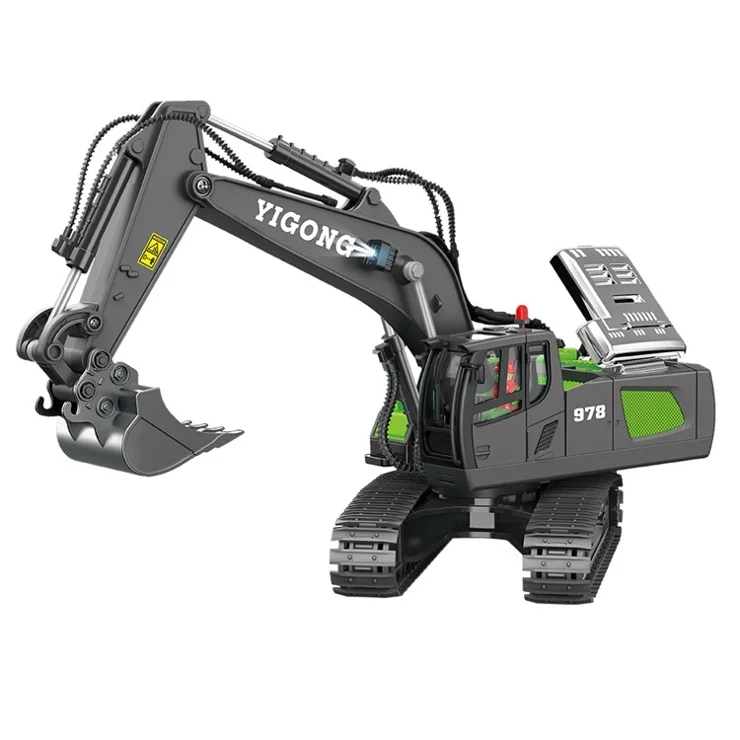Comprehending Just How Excavator Functions and Its Effect On Effectiveness
Excavators play a vital duty in construction and mining procedures, depending on a complex interaction of mechanical and hydraulic systems. Their ability to execute a variety of jobs depends upon both their style and the innovation integrated within. Comprehending these parts can greatly affect functional effectiveness and efficiency. As developments continue to improve the sector, one must consider how these adjustments will influence future techniques and performance.
The Basics of Excavator Mechanics

The Function of Hydraulic Equipments in Excavators
At the heart of excavator procedure lies the hydraulic system, which plays a pivotal role in powering the maker's motions and features. This system makes use of pressurized hydraulic fluid to transfer power, enabling various actions such as swinging, lifting, and excavating. By taking advantage of the concepts of hydraulics, excavators can perform jobs with exceptional accuracy and pressure, improving overall functional efficiency.The hydraulic system is composed of key elements, including pumps, cylinders, and shutoffs, which function together to regulate the circulation and direction of the liquid. When the operator involves the controls, the hydraulic liquid is directed to particular cylinders, translating the operator's commands into physical movement. This mechanism enables responsive and smooth activities, which are crucial in building and excavation environments. double e volvo rc excavator. The efficiency of the hydraulic system straight influences the productivity and versatility of the excavator, making it a crucial aspect in modern-day excavation procedures
Trick Elements of an Excavator
Recognizing the vital parts of an excavator is necessary for comprehending how this powerful maker operates. An excavator contains numerous significant elements, consisting of the undercarriage, home, pail, boom, and arm. The undercarriage gives security and movement, often including wheels or tracks to browse numerous surfaces. Your home consists of the engine and hydraulic systems, allowing the driver to manage activity and power the equipment. The boom prolongs from your house, making it possible for upright reach, while the arm attaches to the pail, promoting digging and lifting operations.Additionally, the cab houses the operator, furnished with controls for accurate maneuvering. Each of these elements plays an essential function in the excavator's overall functionality, adding to its efficiency and performance on building websites. Comprehending these components aids in preserving and maximizing excavator performance, making certain jobs are completed securely and effectively.
Add-on Versatility and Its Benefits
Accessory flexibility is a crucial facet of excavators, making it possible for operators to switch between various tools tailored for certain jobs. This versatility not only enhances job efficiency but likewise adds to cost-effectiveness by minimizing the need for several machines. Recognizing the different kinds of accessories offered can considerably influence the general efficiency and performance of an excavator on job websites.
Kinds of Accessories
While excavators are mainly recognized for their digging capacities, their real convenience hinges on the wide selection of add-ons readily available. These attachments enhance the excavator's performance, permitting it to do numerous tasks past excavation. Usual attachments include pails (for digging and scooping), hydraulic thumbs (for grasping products), and augers (for piercing holes) Grapples are utilized for moving and dealing with debris, while rippers can separate tough surface areas. Various other specialized accessories, such as trenchers and rakes, make it possible for excavators to adapt to certain work needs. This diversity not only boosts the device's energy throughout different fields, consisting of demolition, landscaping, and building, however also permits operators to customize their tools to meet particular task needs effectively.
Boosted Job Performance
Maximizing task efficiency is a key advantage of utilizing different excavator accessories. Different add-ons enable an excavator to do numerous tasks without needing to switch over equipment, conserving beneficial time and labor. As an example, utilizing a hydraulic hammer can break concrete while a container accessory can excavate dirt, allowing a smooth operations. This convenience decreases downtime related to devices modifications and boosts productivity on-site. In addition, specialized accessories enhance accuracy in jobs such as grading or landscaping, bring about better results. The ability to adapt to different work demands not just simplifies operations yet also reduces the demand for additional machinery, ensuring that projects are completed swiftly and effectively. Overall, add-on adaptability considerably adds to enhanced task efficiency in excavation work.
Cost-Effectiveness and Flexibility
Cost-effectiveness is a considerable benefit of using functional excavator accessories. These add-ons enable a solitary excavator to perform numerous jobs, minimizing the requirement for extra equipment and labor - double e volvo rc excavator. By switching in between buckets, hammers, and have a peek at this website grapples, drivers can deal with numerous tasks, from digging to demolition, therefore making the most of tools utilization. This adaptability not only decreases operational prices yet also minimizes downtime connected with changing devices. Furthermore, the capability to tailor excavators with specialized accessories improves efficiency, as they can efficiently manage diverse tasks according to task needs. To wrap up, the combination of cost-effectiveness and flexibility in excavator accessories adds to improved functional efficiency and resource allotment in building and construction and excavation projects

Advanced Innovation in Modern Excavators
Modern excavators are increasingly outfitted with innovative innovation that transforms excavation processes. Automation improves procedures, while improved gas effectiveness lowers operational expenses. In addition, wise control systems improve accuracy and safety and security, noting a substantial advancement in excavation tools.
Automation in Excavation Processes
As excavation modern technology advances, automation has actually become an essential element in boosting effectiveness and accuracy on work sites. Modern excavators are outfitted with innovative automated systems that help with tasks important source such as grading, digging, and trenching with very little operator treatment. These systems make use of sensing units, GPS, and device knowing algorithms to ensure exact placing and deepness control, substantially lowering the margin for mistake. Additionally, automation permits drivers to focus on calculated decision-making instead than hands-on controls, causing improved performance in general. Such technologies not only streamline operations yet also enhance security by lessening human error in complex procedures. Subsequently, the assimilation of automation in excavation procedures represents a substantial development in building technology, driving the sector towards higher efficiency and efficiency.
Enhanced Fuel Efficiency
Developments in innovation have actually also caused considerable enhancements in gas efficiency for modern excavators. Modern machines are geared up with sophisticated engines that enhance power outcome while reducing gas consumption. These engines utilize cutting-edge combustion technologies, such as turbocharging and straight gas injection, to improve performance and performance. In addition, light-weight materials in building and construction minimize overall weight, enabling less energy expense throughout operation. The intro of variable speed controls makes it possible for operators to adjust engine performance according to details jobs, further reducing fuel use. Because of this, these improvements not only lower operational prices but likewise contribute to ecological sustainability by decreasing discharges. On the whole, boosted gas effectiveness in excavators useful site is a vital growth that boosts productivity and financial feasibility in the building and construction industry.
Smart Control Solution
While drivers browse increasingly complex work websites, smart control systems in excavators have become crucial tools for improving effectiveness and precision. These innovative innovations utilize sensing units and formulas to keep track of numerous specifications such as load weight, terrain problems, and operational efficiency. By instantly adjusting hydraulic functions, wise systems optimize equipment performance, resulting in boosted efficiency and lowered wear on elements. Additionally, drivers take advantage of user-friendly user interfaces that give real-time feedback and diagnostics, enabling for educated decision-making. This combination of technology not only improves operations yet likewise lessens human mistake, contributing to safer workplace. As the construction sector proceeds to progress, wise control systems will play an important function in shaping the future of excavator performance and effectiveness.
Enhancing Operational Effectiveness With Excavators
Excavators play a necessary duty in boosting functional performance throughout numerous construction and excavation jobs. Their flexibility enables for several tasks, consisting of product, lifting, and digging handling, which streamlines workflows and reduces the need for additional equipment. With effective hydraulic systems, excavators can do durable tasks with accuracy, substantially lowering the moment needed to total jobs. The assimilation of advanced innovation, such as general practitioner and automated controls, even more maximizes their operation, enabling operators to achieve better accuracy and lower material waste. In addition, contemporary excavators are made to consume much less fuel and minimize exhausts, adding to both price financial savings and environmental sustainability. By making use of excavators properly, building and construction teams can enhance productivity, meet project target dates, and boost total website monitoring. This multifunctionality and effectiveness make excavators essential devices in the contemporary building and construction landscape.
The Future of Excavators in Building and Mining Industries
As the construction and mining markets advance, the future of excavators is poised for considerable makeover driven by technical development and changing functional demands. Advancements in automation and fabricated intelligence are reshaping excavator capabilities, enabling for enhanced accuracy and efficiency in procedures. Autonomous excavators are emerging, lowering the need for human treatment and reducing the threat of accidents.Moreover, the integration of telematics and IoT innovation makes it possible for real-time monitoring of maker efficiency and predictive maintenance, enhancing uptime. Environment-friendly layouts, including hybrid and electric designs, are obtaining traction, straightening with sustainability objectives within the industry.Additionally, using advanced materials and lighter designs enhances gas efficiency while maintaining performance requirements. As these trends progression, excavators will certainly play an essential duty in fulfilling the boosting needs for productivity and security in construction and mining, ultimately changing functional landscapes.
Regularly Asked Inquiries
Exactly How Do Weather Conditions Influence Excavator Performance?

Climate condition substantially influence excavator performance, as rainfall and mud can impede grip and security, while severe temperatures might influence hydraulic systems. Operators must adapt to these variables to assure optimal functionality and safety and security throughout procedures.
What Security Steps Should Operators Follow While Utilizing Excavators?
Precaution for excavator drivers include using appropriate individual protective equipment, performing pre-operation assessments, ensuring correct communication with ground personnel, keeping a risk-free distance from overhanging dangers, and sticking to recognized functional procedures to prevent crashes.
How Usually Should Excavators Be Preserved for Optimum Performance?
Excavators should be preserved routinely to ensure peak performance, normally every 250 operating hours or as specified by the maker. Routine checks boost reliability, avoid unexpected break downs, and prolong the lifespan of the devices.
What Is the Typical Life-span of an Excavator?
The average life expectancy of an excavator commonly ranges from 10,000 to 15,000 hours of operation. Variables influencing longevity consist of maintenance methods, operating conditions, and the high quality of the maker itself, influencing total performance and performance.

Can Excavators Operate Uneven Terrain Successfully?
Excavators can run effectively on uneven terrain because of their verbalized layouts and flexible tracks. These features allow them to preserve security and grip, making it possible for efficient operation in difficult atmospheres frequently run into in construction and landscaping projects. Each of these components plays an essential duty in the excavator's total functionality, contributing to its efficiency and performance on construction sites. Making the most of task effectiveness is a main advantage of utilizing various excavator attachments. While drivers browse increasingly complicated task sites, smart control systems in excavators have arised as crucial devices for improving effectiveness and precision. Excavators play an essential duty in improving operational efficiency throughout various building and construction and excavation jobs. Advancements in automation and artificial intelligence are improving excavator capacities, allowing for improved accuracy and effectiveness in procedures.